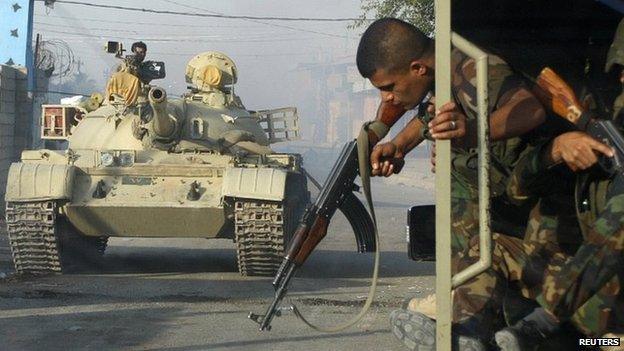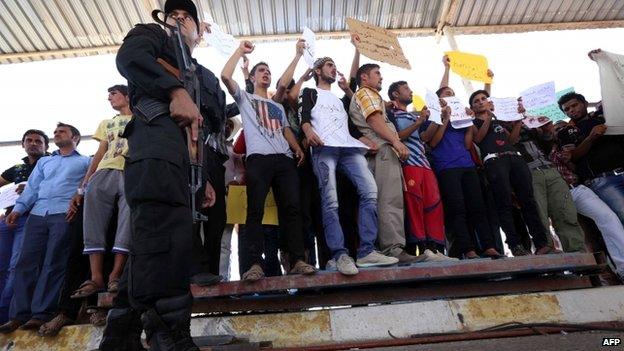Iraq offers air support to Kurdish fighters
- Published

Kurdish forces have suffered a series of setbacks in their campaign against the Islamic State
Iraqi Prime Minister Nouri Maliki has ordered the air force to provide support to Kurdish forces fighting Sunni militants in the north.
It comes after the Islamic State (formerly known as Isis) seized two towns and two nearby oilfields from Kurdish troops over the weekend.
Kurdish forces, known as the Peshmerga, say they are planning a counter-attack.
Militants seized large swathes of northern Iraq from government control in June.
Since then, relations between the autonomous Kurdistan Region and Baghdad have been strained. Correspondents say Mr Maliki's offer of air support could indicate a degree of rapprochement in the face of the Islamic State advance.
In a statement on Monday, Iraqi army spokesman Qassem Atta said: "The commander in chief of the armed forces has issued orders to the leadership of the air force and the army's aviation units to provide air support to Peshmerga forces."
Kurdish leaders have not yet responded to the offer.
Earlier, a Kurdish official told Reuters news agency that Peshmerga forces had been overstretched but were now calling in large numbers of fighters to hit back.
"It is a very dangerous situation for the region. Something needs to be done soon," the official said.
A Syrian Kurdish group, the PYD, said its fighters had crossed the border on Monday. The Kurdistan Workers' Party (PKK) also urged all Kurds to take up the fight against the Sunni militants, Reuters reported.
The PKK has spent three decades fighting for autonomy for Turkey's Kurds and is currently engaged in a peace process with the Turkish government.
Humanitarian warning
The UN said tens of thousands of people from Iraq's minority Yazidi community had fled their homes after the Sunni militants captured the towns of Sinjar and Zumar at the weekend.
Many of those who fled were said to be in exposed mountainous areas near the towns.

Members of Iraq's minority Yazidi community rallied outside UN offices in the Kurdistan capital, Erbil

Who are the Yazidis?
Secretive group whose origins and ethnicity are subject to continuing debate
Religion incorporates elements of many faiths, including Zoroastrianism
Many Muslims and other groups view Yazidis as devil worshippers
There are estimated to be around 500,000 Yazidis worldwide, most living in Iraq's Nineveh plains
In August 2007 jihadists attacked Yazidi villages in Nineveh, killing between 400 and 700 people

The UN special envoy to Iraq, Nickolay Mladenov, told the BBC their situation was desperate.
"We have the supplies in place and we can move them immediately as soon as the security situation permits us to do that," he said.
"The situation is quite dramatic. We have increasing reports of people who have no access to drinking water, not to speak of food or lack of medication."
The Kurdish minority in Iraq managed to establish an autonomous region in the north in 2005 after decades of political and military efforts to seek self-rule.
When jihadists from the Islamic State swept across northern Iraq in June, Kurds seized many areas abandoned by the Iraqi army.
Peshmerga fighters were regarded as one of the few forces capable of standing up to the Sunni insurgents.
In July, the Kurdish political bloc ended all participation in Iraq's national government in protest over claims by Mr Maliki that Kurds were sheltering militants.
IS describes the territory under its control in Iraq and Syria as a caliphate.